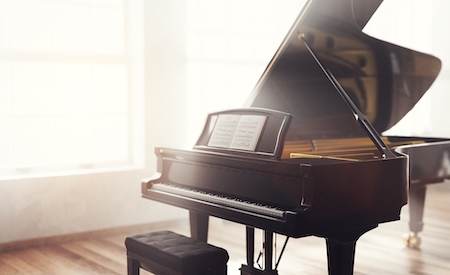Many pianists dream of having a grand piano in their homes. But the thought of ownership can fade when you start comparing prices of the best piano brands. Is it possible to own the piano of your dreams? Yes!
Buying a used grand piano may be the solution. Yet looking around at used grand pianos can leave you even more confused than before. What do you look for? Where do you buy?
As a piano player looking to buy a grand piano, start by learning how to negotiate the best deal. Buying a used grand piano can save you thousands compared to purchasing a new one. However, it can be a daunting task, especially if you don’t know what to look for or how to negotiate.
We work with people daily to purchase the right piano to suit their needs. Here are a few negotiating dos and don’ts we often share with our customers.
Do your Research
Research is key when it comes to buying a used grand piano. Before you start negotiations, research the market price of the piano model you want to buy. This information will give you an idea of the fair market value of the piano. Check online marketplaces, piano retailers, and piano experts to find the ideal price range for the brand and model. The more knowledge you have about the piano, the better you can prepare for negotiations.
Don’t Lowball the Seller
While you want the best possible price, be realistic. Don’t lowball the seller by offering an unrealistic price. A lowball offer can be seen as an insult, and the seller may not take you seriously, jeopardizing any potential negotiations. Be respectful when making an offer, and consider that the seller probably knows more about the piano than you do.
Do Inspect the Piano Thoroughly
Before making an offer, inspect the piano thoroughly. Look for any visible damages or chips that may affect the piano’s sound quality. Check the piano keys, pedals, and strings to ensure they function correctly. If possible, bring a piano technician to inspect the piano more thoroughly. An inspection report can also help you in your negotiations.
Don’t Rush the Negotiations
Take your time when negotiating a used grand piano. Rushing negotiations can lead to bad decisions that cost you more money down the road. Consider the information you’ve gathered about the piano. Listen to the seller’s expectations and counter with a reasonable offer. You can always walk away from the deal if negotiations aren’t going well. But don’t be afraid to negotiate, either. It’s part of the process, and many sellers may be willing to lower the price if you ask respectfully.
Do Negotiate Other Perks
When negotiating for a used grand piano, consider other perks you may receive, such as delivery, bench, piano tuning, or warranty. Including these perks in the negotiation can save you money and increase the value of the purchase. With a used grand piano, you may need to invest money into tuning and restoring it to its original sound quality. Asking for these additional perks can be an excellent opportunity to keep your out-of-pocket expenses to a minimum.
Don’t Be Afraid Of Retail Locations
People often assume they can get the best deal by shopping online. Finding individuals selling their grand pianos isn’t always the safest route. When you only have one grand piano to look at, there’s nothing to compare. Retailers are in the business and have a full spectrum of options. You can compare quality and learn more about what piano is right for you.
Are you ready to buy a used grand piano?
Negotiating when buying a used grand piano may seem intimidating at first. But with the proper preparation and knowledge, you can get the best price and the right piano for you. You can make a good deal and enjoy a beautiful grand piano for years by following these dos and don’ts.
Isn’t that what it’s all about?


